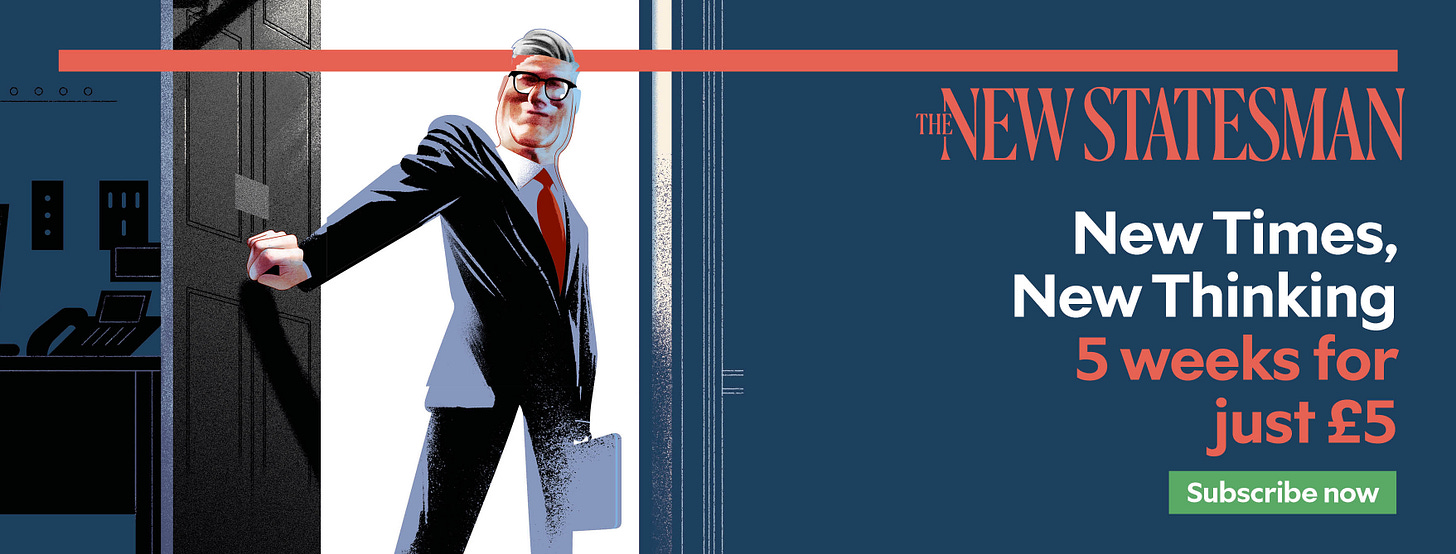Morning Call: Shattered trust
New polling from More in Common shows voters’ faith in government is at an all-time low.
Good morning, Rachel here.
It’s Rachel Reeves day again, as the Chancellor prepares for the Mansion House banquet this evening – a white-tie event in the heart of the City of London that will set the economic agenda across the country. It’s being trailed as a “Big Bang” speech (think Margaret Thatcher 2.0) of deregulation to trigger some of that elusive economic growth the government has been finding it so hard to track down. Front and centre are proposals to make it easier to get on the housing ladder by allowing mortgage lenders to offer deals with smaller deposits. Risky or genius? We’ll be bringing you all the details after the Chancellor speaks.
While the government grapples with ways to make voters feel like their lives are actually improving, a new piece of polling research has put the cat among the political pigeons. The New Statesman’s data expert Ben Walker has looked at what it tells us about the appeal of Reform specifically (if you're interested in how Labour can counter this, we’ve got a podcast for that), and below, I zoom out and explore what seems to be uniting the country at this difficult moment.
Westminster loves a good piece of polling research, and the latest offering from More In Common – dramatically entitled Shattered Britain – has captured imaginations as Parliament limps towards the summer recess.
There is loads in the report to pore over and squabble about – not least the quiz segmenting the British public into seven strata of voter, from Progressive Activists and Rooted Patriots to Dissenting Disruptors and Sceptical Scrollers (which is, incidentally, a great name for a Nineties indie band). The arguments about how these fit into traditional notions of both class and party politics will go on for days.
Key to the analysis is not what separates Brits, but what unites us. And somewhat terrifyingly, that unifying theme seems to be a sense of mistrust. A staggering 87 per cent of people trust politicians not very much or not at all, with net negative trust among all seven groups. This tallies with the latest annual British Social Attitudes survey, published last month, which found that “Just 12 per cent trust governments to put the interests of the nation above those of their own party just about always or most of the time, a record low”.
This lack of trust cuts across a range of different policy areas. On the economy, for example, the cost of living crisis is a key voter concern, with half the public believing it will never get better. This pessimism is understandable, given we have now had 17 years of post-crash politicians telling us that better times (or, if you prefer, sunlit uplands) are just around the corner, if we can only batten down the hatches and make “tough choices” now.
On immigration, a decade and a half of governments promising to bring numbers down while doing the opposite has had a corrosive effect. More In Common’s director Luke Tryl has some thoughts on why the issue of small boats crossing the Channel is so potent: it symbolises governments that have lost control. The inability of a country to enforce its own borders will be disturbing in and of itself to many voters – but even to people who are less concerned about the issue itself, it is symptomatic of a state that is struggling to function.
MPs, by the way, are not blind to this accusation. Conservatives used to lament that ministers would pull a lever to enact change only to find that nothing happened. Labour MPs had little sympathy – but now they’ve been in power for a year, you’ll increasingly hear them say exactly the same. Twice now, from MPs of different parties, I’ve been told that if you pull a lever it could well come off in your hand. On everything from reforming welfare to resolving public sector pay disputes, cutting NHS waiting lists to building new homes, investing in infrastructure to stopping the boats, a sense of stasis pervades. Try to kick the Whitehall machine into gear, I was told, and the machine has a tendency to kick back.
The public, quite reasonably, is not in the mood for excuses. Back in October, barely 100 days since Labour got into power, I sat in on a focus group of people in Sittingbourne, Essex, who had voted for Boris Johnson in 2019 and Keir Starmer in 2024. I was taken aback (as were the organisers) by just how quickly patience with the new government had evaporated – but in a way it made sense. These people had been promised that their lives would get better while things instead got markedly worse for over a decade. They were tired of giving the politicians who had disappointed them the benefit of the doubt.
This exhaustion helps explain why Labour has been so unsuccessful in blaming their present challenges on the last government, as David Cameron and George Osborne managed to do effectively for years with their line that “Labour crashed the economy”.
It also goes some way to explaining the rise of Reform – or rather why the criticism that Reform is not a serious party with serious policies is failing to land. (If you’re curious about what attack lines Labour could use against Nigel Farage that might actually work, check out the latest NS podcast where polling analyst Steve Akehurst shares his latest research on exactly this topic.)
“The sense that Britain is broken, and that none of the traditional parties or institutions can fix it, is leading more people to think that we need to roll the dice on something new,” reads the Shattered Britain report. Polling from last month ahead of the Spending Review, also by More In Common, found a similar sentiment in the increasing willingness to gamble – to hell with the consequences. As I wrote at the time: “While 46 per cent of people believe Reform would indeed be a risk to the economy (compared to 29 per cent who don’t), almost as many (40 per cent) believe the risk is worth it as ‘Reform can’t be worse than the other parties when it comes to managing the economy’.”
It’s unclear how politicians from mainstream parties can possibly respond to all this, given the scale of the challenge and how rapidly the public expects solutions. But tucked away at the very end of the report is the line that “Britain’s political map is fundamentally changing as frustration with the status quo is leading to traditional two-party loyalties collapsing into a volatile multi-party system”. We can debate whether the fact that the last election was the most disproportional ever in terms of how the number of votes related to the number the seats, and whether this is a driver or a symptom of the decline in trust in politics (are voters abandoning traditional parties because they feel let down, or do they feel let down because their votes for non-traditional parties aren’t properly counted?). But it’s hardly a sign of a democracy in good health.
The pithily named voter segments don’t just suggest a realignment in politics, but a degree of fragmentation that is difficult to map onto a two-party system. Does “difficult” in fact mean “impossible”? Something for MPs to chew over as they prepare for their summer holidays.
Rachel’s picks
Is Trump really serious about getting tough on Putin this time? Katie Stallard is dubious.
Intriguingly, David Littlefair argues that a new left-wing Corbyn-Sultana party might actually help Keir Starmer.
David Gauke wants to know why Brexiteers cannot get the lurid fantasy version of French President Emmanuel Macron out of their heads.
And if you've been disheartened by the trend for bemoaning how awful London has become because of all the immigrants, I offer a more optimistic antidote.
From our partners
Cybersecurity vendors are key in enabling organisations to place responsible disclosure at the core of their operations, writes regional director, UK & Ireland, at Fortinet, Richard Woolfrey.
Mailshot
Guardian: Labour not learning from deaths of domestic abuse victims
LabourList: Majority of Labour members oppose government’s anti-migration
Simon van Zuylen-Wood: Canadians are furious
James Wood: Geoff Dyer’s Britain
World’s biggest human imaging study scans 100,000th person
And with that…
Have a good day. George will be with you tomorrow.








I think you'll find that Sittingbourne is in Kent, not my old home of Essex
Sittingbourne is in Kent which is full of people with a distrust of those north of the Thames.